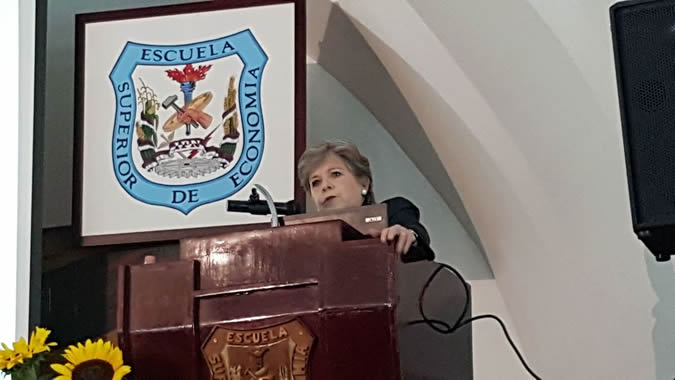Alicia Bárcena Banks On Moving Toward a Knowledge-based Economy to Achieve the SDGs
ECLAC’s Executive Secretary gave a keynote speech at the Superior School of Economics of Mexico’s National Polytechnic Institute, on the eve of the first meeting of the Forum of the Countries of Latin America and the Caribbean on Sustainable Development.

Implementation of the 2030 Agenda in the region can pave the way for moving toward a knowledge-based economy that promotes innovation, increases productivity, creates quality employment and allows for reducing inequality, the Executive Secretary of the Economic Commission for Latin America and the Caribbean (ECLAC), Alicia Bárcena, stated today during a keynote speech in Mexico City.
The senior United Nations official made a presentation entitled The 2030 Agenda for Sustainable Development and the 17 Sustainable Development Goals (SDGs) at the Superior School of Economics of Mexico’s National Polytechnic Institute, on the eve of the first meeting of the Forum of the Countries of Latin America and the Caribbean on Sustainable Development, which will take place in the Mexican capital on April 26-28.
This conference kicks off celebrations of the 65th anniversary of the Superior School of Economics at Mexico’s National Polytechnic Institute, which is considered one of the country’s most important public educational institutions and was founded in 1936 by then President Lázaro Cárdenas del Río with the aim of promoting the training of technicians and professionals who could contribute to the nation’s development.
In her speech, Alicia Bárcena explained that the 2030 Agenda, adopted in 2015 within the United Nations, is the international community’s response to global imbalances, the most striking of which include the declining rate of growth in production and trade, the decoupling between the financial system and the real economy, high levels of inequality and environmental deterioration.
On top of these factors, the external context is both uncertain and complex, with geopolitical changes, protectionist trends, tensions in the world of work, intense migratory flows, and the coming of the fourth industrial revolution, ECLAC’s Executive Secretary indicated. In addition, Latin America and the Caribbean faces circumstantial and structural challenges of its own, Bárcena said.
The region is suffering from a persistent productivity gap that endangers social achievements in the long run and also acts as a motor that stokes inequality, since employment is concentrated in sectors with low productivity and, therefore, reduced wages. Scarce innovation and technological progress also hinder the growth potential of Latin American and Caribbean countries, she stated.
With a poor export performance in the last five years and a regional economic growth projection of 1.1% in 2017, according to ECLAC’s calculations, the implementation of the 2030 Agenda will require mobilizing public resources in the coming years, increasing the tax burden (the average in Latin America and the Caribbean was 22.8% of GDP in 2015), changing its structure and reducing evasion (estimated at 6.7% of regional GDP), the regional organization’s top representative underscored.
In addition, Alicia Bárcena highlighted that the emergence and development of a knowledge-based economy and the technological revolution constitute an opportunity for making the environmental big push that ECLAC proposes as the path for implementing the 2030 Agenda in the region, through investments in knowledge-intensive sectors that contribute to reducing carbon emissions and creating quality jobs.
ECLAC’s Executive Secretary added that implementing the 2030 Agenda will necessitate multilateral cooperation and regional integration via spaces such as the Forum of the Countries of Latin America and the Caribbean on Sustainable Development, which is the regional follow-up mechanism on implementation of the 2030 Agenda and which will hold its first meeting starting this Wednesday.
At the end of her keynote speech, ECLAC’s most senior representative and the Secretary for Outreach and Social Integration of the National Polytechnic Institute, Francisco José Plata, signed a three-year cooperation agreement between both institutions to carry out joint initiatives in the academic, scientific and cultural arenas.
Related content
La Agenda 2030 y los Objetivos de Desarrollo Sostenible
Presentación de Alicia Bárcena, Secretaria Ejecutiva de la CEPAL, en el ciclo de conferencias “Los límites del desarrollo económico y las políticas públicas”. Instituto Politécnico Nacional de México…
Subregional headquarter(s) and office(s)
Country(ies)
Contact
Public Information Unit
- prensa@cepal.org
- (56 2) 2210 2040